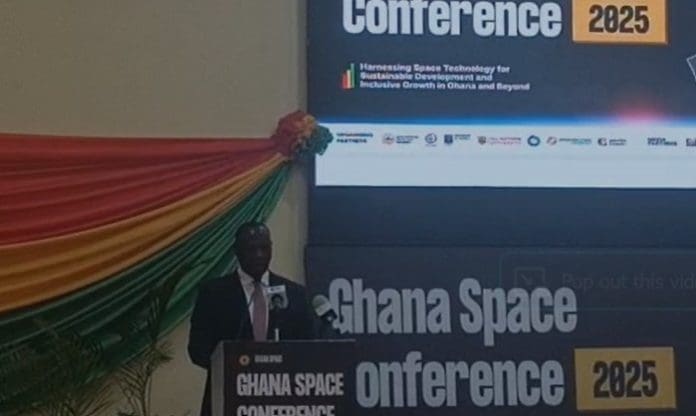Ghana’s Minister for Lands and Natural Resources, Hon. Emmanuel Armah-Kofi Buah, has outlined an ambitious vision for the country’s future in space science and technology, declaring that the government is determined to make Ghana not just a consumer, but a producer of space-driven innovations.
Speaking at the maiden Ghana Space Conference held at the University of Ghana in Accra, Hon. Buah described space technology as a “tangible tool for national development” and a “driver of human progress.” He emphasised that Ghana’s engagement with space science is not a luxury, but an existential necessity for tackling pressing national challenges such as climate change, illegal mining, and food insecurity.
“Every time you use a mobile phone or check a weather forecast, you are interacting with space technology,” the Minister noted. “It is the GPS that connects our communities. For Ghana, our interest is not merely about economic value but about existential value.”
He revealed that Ghana has approved three landmark policies to anchor its space ambitions — including a National Space Policy, which positions the country to innovate, contribute, and lead in the emerging African space economy.
According to Hon. Buah, the Ministry’s support for the Ghana Space Conference is part of a broader strategy to ignite a national conversation that will echo for generations, as the country seeks to integrate space applications into key sectors of its development.
“Space science and technology provide critical tools to tackle the very challenges we face — from monitoring forests in real time to curb illegal mining, to providing farmers with data on soil moisture and pest threats,” he explained.
The Minister underscored the importance of space technology in disaster preparedness, climate resilience, and agricultural planning, noting that with accurate satellite data, Ghana can better predict droughts, manage coastal erosion, and strengthen food systems.
He further highlighted the relevance of space applications to trade and logistics under the African Continental Free Trade Area (AfCFTA), saying that space-enabled systems can help Ghana build smarter supply chains, optimize trade routes, and solidify its position as a logistics hub for Africa.
Outlining government’s four key commitments, Hon. Buah said Ghana will:
Train the next generation of scientists, engineers, and entrepreneurs to ensure the country becomes a producer of space technologies;
Build the necessary institutional frameworks, including a national space agency;
Invest in research and innovation infrastructure; and
Foster regional and international collaboration in space development.
“We are serious about space. We have the policy, we are building an agency, we have outlined our vision — and above all, we possess the quality we need. Ghana is ready to stand tall and contribute,” he affirmed.
The conference, which brought together scientists, policymakers, and private sector stakeholders, is expected to mark a turning point in Ghana’s pursuit of space science as a strategic national priority and a pillar of sustainable development.
Source: newsghana.com.gh











